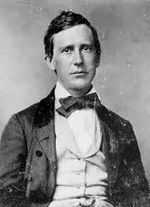Annotation:Louisiana Belle: Difference between revisions
No edit summary |
No edit summary |
||
| (2 intermediate revisions by the same user not shown) | |||
| Line 6: | Line 6: | ||
'''LOUISIANA BELLE.''' American, Minstrel Air (2/4 time). G Major. Standard tuning (fiddle). AAB. "Louisiana Belle" was the first of Stephen Foster's (1826-1864) minstrel songs to be published, issued in October, 1847, although the composer was not credited. Instead, the copyright was taken out by W.C. Peters, the publishers. | '''LOUISIANA BELLE.''' American, Minstrel Air (2/4 time). G Major. Standard tuning (fiddle). AAB. "Louisiana Belle" was the first of Stephen Foster's (1826-1864) minstrel songs to be published, issued in October, 1847, although the composer was not credited. Instead, the copyright was taken out by W.C. Peters, the publishers. | ||
{{break|11}} | |||
It speaks of Louisiana, "Whar Massa us'd to dwell." The slave owner "Had a lubly cullud gal./'Twas the Louisiana Belle."<br> | |||
CHORUS: | |||
<blockquote> | <blockquote> | ||
Oh! Belle don't you tell, don't tell Massa, don't you Belle, <br> | ''Oh! Belle don't you tell, don't tell Massa, don't you Belle,'' <br> | ||
Oh! Bell, de Lou'si..a..na Belle, <br> | ''Oh! Bell, de Lou'si..a..na Belle, ''<br> | ||
I's gwine to marry you Lou'siana Belle.<br> | ''I's gwine to marry you Lou'siana Belle.''<br> | ||
I wen to de ball de udder night, <br> | ''I wen to de ball de udder night, ''<br> | ||
I cut a mighty swell; <br> | ''I cut a mighty swell; ''<br> | ||
I danc'd de Polka pigon_wing, <br> | ''I danc'd de Polka pigon_wing, ''<br> | ||
Wid de Lou'si...a.....na Belle. <br> | ''Wid de Lou'si...a.....na Belle. ''<br> | ||
</blockquote> | </blockquote> | ||
Latest revision as of 08:23, 5 December 2021
X:1 T:Louisiana Belle M:2/4 L:1/8 R:Minstrel Tune B:Gumbo Chaff - The Complete Preceptor for the Banjo (1851, p. 5) N: A later edition of the earliest known banjo tutor, published in 1848. It was written by Elias Howe, whose pseudonym Gumbo Chaff N:is taken from Thomas Dartmouth Rice's 1834 blackface character. The 1851 edition was published in Boston by Oliver Ditson. N:In 1850 Howe sold some of his works to Ditson (this one among them) and agreed not to publish similar works for ten years. Z:AK/FIddler's Companion K:G G|Bd d/d/ z/d/|ee d z/d/|f>f g>g |a2 zd| Bd dd|ee/g/ d(3d/e/f/|g>g a>f|g2 z2:| g2d2|e z/e/d2|ee d<d|c>c B2| g2 d>d|e/e/e/e/ d2|ff/f/ g/g/g|a/a/a/f/ gz||

LOUISIANA BELLE. American, Minstrel Air (2/4 time). G Major. Standard tuning (fiddle). AAB. "Louisiana Belle" was the first of Stephen Foster's (1826-1864) minstrel songs to be published, issued in October, 1847, although the composer was not credited. Instead, the copyright was taken out by W.C. Peters, the publishers.
It speaks of Louisiana, "Whar Massa us'd to dwell." The slave owner "Had a lubly cullud gal./'Twas the Louisiana Belle."
CHORUS:
Oh! Belle don't you tell, don't tell Massa, don't you Belle,
Oh! Bell, de Lou'si..a..na Belle,
I's gwine to marry you Lou'siana Belle.
I wen to de ball de udder night,
I cut a mighty swell;
I danc'd de Polka pigon_wing,
Wid de Lou'si...a.....na Belle.
The melody (along with a number of blackface minstrel pieces) was entered into the mid-19th century music manuscript collection of Bellport, Long Island, ship's captain and fiddler biography:Isaac Homan (1816-1901).
Known as "the Father of American Music", Foster was the major songwriter of 19th century America Inducted into the Songwriters Hall of Fame in 1970.

